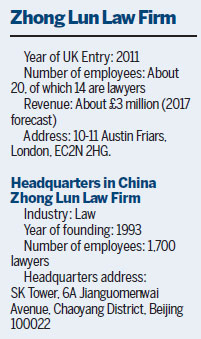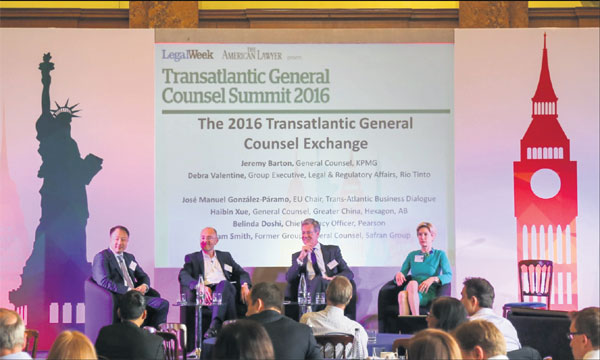Crossing the legal frontiers
Chinese law firm's subsidiary is uniquely equipped to deal with the complexities of deals in the UK
In 2012, a famous British author published a highly anticipated novel in the United Kingdom, and originally considered the option of publishing an official Chinese version several months later. Her lawyer Xue Haibin advised her against it.
"If she had waited a few months to publish the Chinese translation, all her China fans would have read unofficial translations, so her books wouldn't have sold," says Xue, managing partner of the Chinese law firm Zhong Lun's UK subsidiary.
|
Xue Haibin (left), managing partner of the Chinese law firm Zhong Lun's UK subsidiary, speaks on a panel at a London legal conference last year. Provided to China Daily |
Xue's logic was simple. For a highly anticipated novel like this, Chinese fans overseas could easily work out the plot and share their own translations of the story with their Chinese friends online. Their translations would not be very good grammatically, but could seriously impede how the book sold in China if publication was done a few months later. This common-sense suggestion from Xue's team perhaps created more value for the author than strictly legal advice on IP protection.
In 2011, Zhong Lun established its UK office with just under 10 million yuan ($1.5 million; 1.3 million euros; £1.17 million) of investment from headquarters. Located at the heart of London's Square Mile financial district, it joins Zhong Lun's overseas offices in Los Angeles, San Francisco, New York and Tokyo.
Xue says Zhong Lun's UK expansion is not just about the nitty-gritty of law, but also about using the team's experience and expertise to help British and Chinese companies do business more efficiently and effectively.
"We leverage on our team's grasp of both Chinese and UK cultural and legal systems to focus on advising cross-border deal flows."

Over the years, Xue's team has advised on deals across the fields of mergers and acquisitions, property investments, corporate litigation and more sophisticated sectors such as project and structured finance.
Deal volume is hard to estimate, mainly because some deals fell through, but Xue says he remembers handling 16 live deals simultaneously himself at the busiest point in time. He estimates a revenue of £3 million ($3.86 million) from the UK office this year.
Founded in Beijing in 1993, Zhong Lun was one of China's earliest private law firms approved by the Ministry of Justice. It now has 1,700 lawyers, of whom 268 are partners. To put things in perspective, China's largest private law firm, Dacheng, with more than 4,000 lawyers, was established just a year earlier in 1992.
Zhong Lun's strength is perhaps shown by the number of awards it has received over the years. Over the past three years, the London-based legal industry ranking body Chambers and Partners recognized Zhong Lun as among the top seven Chinese law firms in corporate and finance law, and among the top five in dispute resolution law.
Chambers also gave Zhong Lun "Band 1" status for 27 practice areas in 2017, ranging from banking and finance to environmental law; from real estate to corporate M&A. In China, Zhong Lun has an impressive client list comprising both Chinese and Western companies, including China Africa Development Fund, IBM, Morgan Stanley and Walmart.
Perhaps what gives Zhong Lun a unique advantage in the UK is its status as the earliest Chinese law firm licensed to practice English law, under the regulation of Britain's Solicitors Regulation Authority. Xue says this gives it an edge over other major Chinese law firms that are also attempting UK expansion. China's Yingke, another Beijing-based law firm, for instance, operates in the UK through partnership with the British law firm Memery Crystal, meaning Yingke's own lawyers do not practice law within the UK jurisdiction.
Explained more practically, having SRA-regulated status means legal documents prepared by Zhong Lun receive formal British recognition, which is crucial in certain situations, such as when preparing legal documents to take a Chinese company public on the London Stock Exchange.
Satisfying SRA regulation also means Zhong Lun needed to meet an array of additional standards uncommon to China's legal system, such as independent and separate client accounts and Western standard professional indemnity insurance coverage. These additional requirements are normally not met by Chinese law firms, as Chinese regulators do not have such requirements.
"We have found a niche sector position for ourselves in the UK market targeting cross-border deals, so that we can cooperate with both Chinese and British law firms instead of competing with them directly," says Xue.
In addition to legal advice, Xue and his colleagues also use their knowledge of the UK's business environment to help clients do business in the UK, which is often much appreciated by Chinese companies with less international knowledge and expertise.

He recounts one story, when a Chinese company bought an advanced technology company in the English Midlands and took his team's advice to give the existing CEO of the acquired British company the new job title of deputy managing director of the group business.
"Giving this extra benefit to the British managing director effectively motivates him to make decisions not just from the British subsidiary's perspective, but also from the group level perspective, which adds so much value to the parent company," Xue told his client, and his client agreed.
The strategy worked well. The British CEO soon helped the Chinese company identify another local UK company to acquire and led negotiations for the transactions, which are now underway. Without his help, the Chinese team would not have come across the opportunity for the second acquisition.
Chinese companies' increasingly diversified and sophisticated business activities in the UK also mean the legal support they require is becoming more sophisticated, says Li Chengrong, another partner at Zhong Lun in the UK.
For instance, Li is currently advising many Chinese companies that have historically bought British commercial properties using their own equity capital, but are now looking to withdraw a part of their equity from these properties by taking out bank loans in the UK as financing replacement.
To achieve these new financial structures, Chinese companies often need to establish offshore financing structures in "tax haven" jurisdictions, such as Jersey, Guernsey or the Isle of Man, because creating a new structure to achieve refinancing typically has the benefit of giving the parent company more legal protection, in addition to tax benefits.
"Cultural differences and legal differences all come into the play when advising Chinese clients on these more sophisticated business activities," Li says.
For instance, when it comes to offshore financing structures, one requirement Chinese clients find hard to understand is why the central control and management of the offshore entity should be conducted offshore, and they often worry about a loss of control over the offshore entity.
Added to the complexity is the fact that the directors of offshore special purpose vehicles are often not actual people, but companies.
"Chinese companies setting up these offshore structures for the first time may find it hard to understand how a director of a company can be another company. The answer is that often in offshore tax jurisdictions, there are many professional companies that specialize in directorship services, so it makes sense for clients to fill their director seats with such companies rather than individuals," Li explains.
All these complex legal considerations are rather unfamiliar to Chinese companies, and Li argues that Zhong Lun's lawyers' are in a much better position to explain these differences to Chinese clients than either Chinese or British law firms.
"I don't think a UK company can effectively explain these requirements to Chinese companies, even with the help of translation."
cecily.liu@chinadaily.com.cn
( China Daily European Weekly 06/16/2017 page30)



















